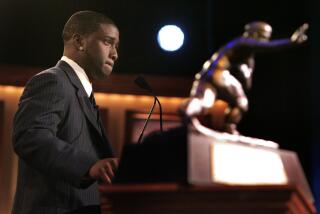Tiger Woods’ path to redemption has been blazed by many who preceded him
Since Tiger Woods first hit a fire hydrant outside his home, the most curious thing about l’affaire Woods has been the golf star’s clumsy handling of the fallout.
There was his refusal to meet with the cops. The truculence of his initial public statement (“my family and I have been hounded”). And then his attempt to make the whole thing go away by talking around it -- on his website, that first statement was headlined, “Tiger comments on current events.”
On Friday, finally, the first hint arrived that he’s getting his mind around what he really needs to do.
His statement announcing that he would take an “indefinite break from professional golf” used the word “infidelity.” That was a step forward from “transgression,” which was the weasel word of statement No. 1. He further said that he was “profoundly sorry” and asked forgiveness.
Here’s betting that he understands that this is only the first step toward recovering his public form.
Before we examine the path from perdition, let’s put the Woods matter in perspective. There’s no point pretending that we the media or you the audience are invading Tiger Woods’ privacy by displaying interest in what led to his day-after-Thanksgiving crash, or in the details about his life that have surged since then into the public domain.
Tiger’s profession is golf, but his business is the creation of a public image. A sizable economy depends on his ability to do so -- the PGA tour, purveyors of Tiger-branded merchandise and the makers of golf clubs, automobiles and everything else he endorses.
Up to now he has been skilled at creating a positive persona while keeping any other side of his character locked away from view. Press interviews were tightly controlled and the only side of Tiger the public ever got to see was the squeaky-clean one.
It’s only natural, then, that the moment he was involved in an incident he couldn’t control, a tidal wave of public curiosity spilled into the breach.
I could bemoan the prurient speculation that ensued and the all-Tiger-all-the-time press coverage, but really, these are natural phenomena. You want to live off the attention produced by your talent and wealth, sometimes this happens.
As for his now-obligatory response, let’s not be too cynical about it. The machinery of the public apology has developed over decades, to the point where its moving parts are very well understood by practitioners and their audiences.
National leaders have apologized for historical insensitivities, often for those that happened before they were born. Movie stars beg forgiveness for their addictions to drugs, alcohol, sex; pro football players for legal but over-aggressive hits; television pundits for inadvertent (or maybe deliberate) ethnic slurs.
The comeback trail for Woods has been blazed by many who preceded him; in fact, it’s been obvious almost from the first.
What’s required is the public confessional. Fortunately, one thing our culture has in surfeit is public confessors.
My prediction is that Tiger will eventually go on a national TV program and confess all. Undoubtedly, he will have his pick of venues, all of which are probably already clamoring to offer him a platform on his terms. He need only settle on his preferred atmospherics.
He can talk to Oprah Winfrey if he wants nurturing commiseration. Larry King for a veneer of newsiness. Diane Sawyer for condescending solicitude. Matt Lauer for sensitive, manly contrition. Barbara Walters to display inner turmoil and personal growth.
The key is to produce a foundational narrative encompassing (a) the nature and scale of his offense (adultery); (b) the events of Nov. 27, with all the weird aspects credibly explained even if barely so (i.e., where was he going at 2:30 a.m. and what was his wife really doing with the golf club?); and (c) an apology.
If done right -- and we must assume that Tiger is finally consulting with professionals -- this procedure will accomplish some very important goals. It will allow him to deflect queries on the subject forever after, by referring questioners to the ur-narrative on videotape. It will satisfy the public’s demand that process be respected -- give most people, at least, what pop psychologists like Oprah herself call “closure.”
If done right, it might even enable him to turn the tables on the curious by making them seem the churlish ones. By the way, whatever show he’s on will rack up the ratings of the season.
The question of genuine remorse is a tricky one. I have no problem believing that for Tiger, the turmoil of recent days has been life-changing. No amount of money or fame can insulate a person from that.
As the program of redemption plays out, Woods will have numerous advantages. His public persona as a straight-shooting “boring” individual (to use his term) who happens to have incredible talent remains a potent one. He doesn’t project irredeemability, like Michael Vick, nor is philandering necessarily a socially disqualifying offense, like dog-fighting. And Vick, after all, is now back in the NFL.
Plus, professional golf carries an aura of gentility. It’s not as though Woods is confirming an unsavory element of a sport’s image, like a misbehaving NBA star or an NFL lineman caught with an unregistered firearm.
On the other hand, he can’t ply his trade in isolation, like a movie star who sticks to closed sets. He has to play in public, amid crowds whose ranks might include a few ill-wishers intent on shouting insults, ejection be damned. But if he handles this right, those crowds will end up being self-policing.
I hope they are. The spectacle of Tiger Woods being tormented by scandal hasn’t been uplifting or edifying. It may be natural, but it isn’t civilized. Woods is a paragon of physical grace, hard work and athletic achievement, and the best outcome for him would be his speedy return to the tour.
Michael Hiltzik’s column appears regularly on Mondays and Thursdays. Reach him at michael.hiltzik@latimes.com.
More to Read
Get our high school sports newsletter
Prep Rally is devoted to the SoCal high school sports experience, bringing you scores, stories and a behind-the-scenes look at what makes prep sports so popular.
You may occasionally receive promotional content from the Los Angeles Times.







